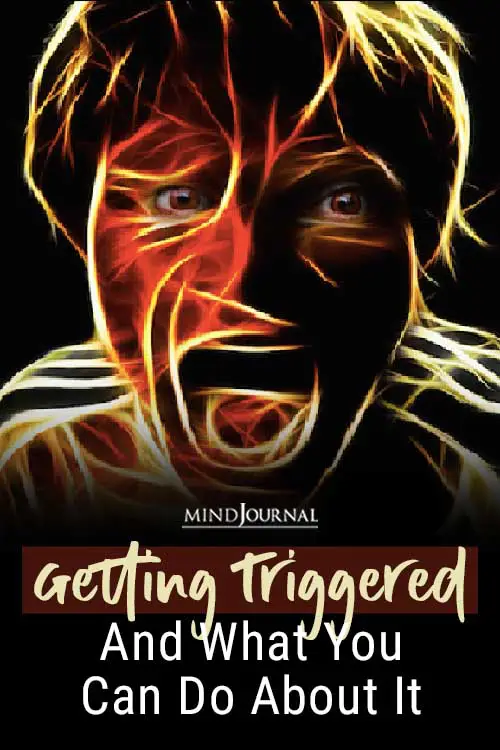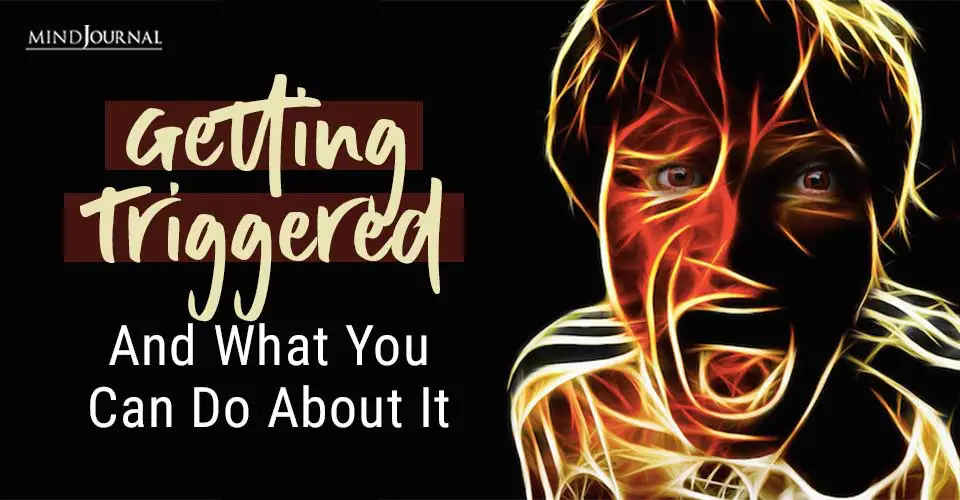Getting your “buttons” pushed or getting “triggered” is an opportunity to heal and grow. The more hurts we’ve endured and the weaker our boundaries, the more reactive we are to people and events.
Our triggers – our buttons – are our wounds.
Codependents are off the charts when it comes to reacting to others’ feelings, needs, problems, opinions, wants, and more. When we react, we permit our insides to be taken over by someone or something outside of us. There’s no filter or boundary. We’re pulled off center and might start thinking about that person or about what might happen in the future. Negative reactions easily escalate hurt feelings and conflict. Often, however, we’re really reacting to someone from our past.
A wise, apropos Al-Anon slogan is “Q-Tip,” – “Quit Taking It Personally.” Interpreting someone else’s words or actions to be a comment about us is taking another person’s feelings personally. We might react with guilt or defensiveness because we assume we’re the cause of someone else’s negative emotion or problem. We have just taken on the other person’s problem or shame when they shame or blame us. Our peace of mind and self-esteem now resides with someone else.
Defining Triggers
What we react to – our “triggers”– are unique to our personality and individual history. Think of triggers as wounds – often from past trauma. When we’re triggered, we’re re-experiencing a past injury in the present time – similar to a post-traumatic stress reaction. It’s reopening a painful wound that hasn’t had a chance to heal.
A sign of being triggered is when our reaction is disproportionate to the present event or not reasonably related to the actual present facts.
Related: What Triggers Your Anxiety Most, Based On Your Zodiac Sign
Internal Triggers
Primary triggers are internal, dysfunctional personal beliefs that we learned in childhood. We can trigger ourselves into feeling ashamed if we don’t measure up to standards we’ve adopted for ourselves. We can easily activate our inner critic to ruin our day or our life! Do the steps in 10 Steps to Self-Esteem: The Ultimate Guide to Stop Self-Criticism to quiet your critic and overcome the “tyranny of the should’s.”
An example is a belief that we should self-sacrifice for other people. Codependents generally deny or devalue their needs. Given this belief, it thus makes sense to put the needs of others first and feel guilty or ashamed not to. Someone asking for help would thus trigger our automatic offer of assistance, even when that could harm ourselves or be counterproductive to the person asking.
Shame-based beliefs about ourselves can make us vulnerable to being triggered by the words and behavior of others. When we’re criticized, whether or not it’s intentional, we can easily surrender our self-esteem and sense of well-being. A common trigger for codependents is being told they’re “too sensitive,” or “selfish.”
Frequently, their parents dismissed their feelings or needs with these shaming labels. However, labels stick, despite the fact that they were said by an insensitive or selfish parent. We can grow up feeling branded for life, even though the judgments were untrue.
Want to know more about getting triggered? Check this video out below:
External Triggers and Overreactions
In some cases, triggers are signs of danger that preceded an earlier wound. We learned to react to them in order to be safe and loved. Sometimes these warnings are helpful, but when applied automatically to a different situation, our reactions can be dysfunctional. This is particularly true when we overreact.
Overreactions occur when the intensity and duration of our feelings and/or behavior are disproportionately greater than normal under the present circumstances. We overreact when we’re reminded of an experience we’ve had with someone or something important in our past.
They may be hard to recognize in ourselves because we believe our perceptions are accurate, but they’re easy to identify in others. For instance, when a hypervigilant war veteran draws his gun upon hearing the walls creak at night – his behavior is appropriate in a war zone, but not when he’s safe at home.
Similarly, we might appropriately slow down if we see a police car to avoid a speeding ticket, but if our past experience with the police has endangered us, we might attempt to flee, drawing the police’s attention and leading to a serious conviction for reckless driving. An overreaction can bring about exactly what we’re attempting to avoid.
In some cases, overreactions are learned behavior that was modeled by a parent. Some people catastrophize everything, creating constant melodrama and mountains out of molehills. They may have grown up living in a perpetual state of crisis, and although they claim to hate it, they repeatedly recreate their stressful childhood environment.
Related: 10 Hidden Anxiety Triggers You Need To Avoid
More common examples of overreactions are: Marge worries that her husband is having an affair when he has to work late. This triggers for her because her father worked long hours and cheated on her mother. When Marge asks her husband to help with the dishes, he becomes angry that she’s “telling him what to do.”
In fact, he’s reacting to his domineering mother from his youth, not his wife. Marge was intimidated by her mother’s anger, so when her husband is angry, she accepts his blame and apologizes, though she did nothing wrong. By doing so, she not only reinforces his erroneous projection, but she also is encouraging his abusive communication.
Healing Our Triggers
The first step in healing triggers is being able to identify them, as well as your internal beliefs. Remember that these are wounds, and approach them with compassion and tenderness. Depending upon what the trigger is, healing may involve the stages of grief and/or re-evaluating the context and validity of learned beliefs.
People have different styles of reacting. One person might withdraw, while another attack. It’s important to identify your reactive behavior and learn to detach rather than react. Then, evaluate the function and effectiveness of your behavior, and experiment with more productive responses. (For suggestions and exercises, see Codependency for Dummies.) As noted above, both overreactions and dysfunctional reactive styles can contribute to the problem we want to avoid. For example, placating an abuser invites more abuse, while setting effective boundaries diminishes it over time.
With healthy self-esteem and intact boundaries, we’re able to see that another person’s actions and point-of-view are not a reflection on us, but express his or her unique perspective, experience, needs, and feelings. There’s no need to react, only to listen and respond. Once we’re more connected to our real selves, we can tolerate differing opinions and even negative feelings about us.
Related: 13 Signs You’re Struggling With Emotional Numbness and How To Overcome
We can listen to our own feelings and think about the other person’s words and actions. We can decide whether we agree and whether we’re responsible for the other person. We alone determine what we want to do, if anything, and whether we owe an apology.
When we’re reacting, sometimes anger covers up really hurt or vulnerability, blame may be hiding guilt, and self-blame may be displaced anger we have toward someone else. When we take time to connect to our true selves, if we have feelings about what was said, we can respond authentically, which is different from an automatic knee-jerk reaction.
We needn’t feel angry just because our partner is, nor guilty because he or she is hurt or upset with us, and we needn’t stop speaking to him or her when we’re being stone-walled. This is why meditation and learning to detach is so important in recovery. By not reacting, we can relate in a more authentic manner, which invites the same from other people and dramatically changes our interactions with them.
© Darlene Lancer 2017
Written by Darlene Lancer JD, MFT
Originally appeared on WhatIsCodependency.com










Leave a Reply
You must be logged in to post a comment.